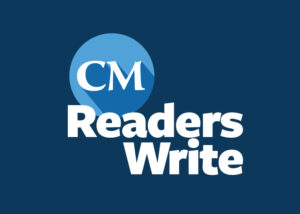‘Better stories’ needed for ‘future inventories’
Re: “A Black/Menno inventory,” June 22, page 13.
I deeply appreciate this column. While I am sure that there is much more history than could fit in it, I wonder how to understand the general scarcity of stories of cultural contact and sharing. Is it too pessimistic to ask if the “gaps” in this Mennonite history indicate indifference or mistrust of Black neighbours rather than acceptance and neighbourliness?
A few years ago, I visited the St. Catharines, Ont., church once attended by Harriet Tubman in between her journeys of salvation to rescue enslaved Africans. The church basement walls are covered in photos of Black Canadians dating back to the invention of the camera. The message is clear: Black people have been in Canada since the beginning, whether as enslaved people, as liberated (and liberator, like Tubman), or as settler-immigrants and community members. We should have stories about each other!
As someone not raised Mennonite, and without any family connection to the Black experience in Canada, I am trying to learn from both communities, which are not exclusive. The column suggests that, historically, Mennonites have not learned from, or acknowledged, the spiritual wisdom of Black communities. It is of critical importance that we centre voices that we have marginalized, embracing the challenge and possibility of interculturality.
I am grateful for the grace of those working with and within the Mennonite church as we seek this blessing. May we have better stories to tell for future inventories!
—Peter Haresnape, Toronto
The writer is a pastor of Toronto United Mennonite Church and the national coordinator of the Student Christian Movement of Canada.
Polio mercy flight ends in tragedy
Re: “Legacy of the last great epidemic: The drama and trauma of polio lingers,” June 22, page 26.
This poignant article that, during our current COVID-19 pandemic, recalls the hardships of the 1950s polio epidemic, reminds me of my uncle, Gordon MacDonald, who died in an air ambulance crash on Nov, 22, 1953, while flying a seriously ill polio patient and his doctor from a remote jobsite to Edmonton for an iron-lung treatment. No polio vaccine was available then, but the cumbersome iron lung helped patients breathe, hopefully to survive the disease.
Flight Lieutenant MacDonald served with the Royal Canadian Airforce (RCAF) during the Second World War as a bomber pilot and squadron leader. He flew 119 sorties between 1941 and 1945, and was awarded the Distinguished Flying Cross in 1944. When he left the RCAF in 1946, my uncle wanted only to go back to farming with his dad, “to feed and work with livestock, feel the soil in his hands and with his bare feet.” Like so many soldiers, he returned from the war bearing scars of mind and body that are hard to heal.
Uncle Gordon tried farming and married his sweetheart, did a stint in the civilian air force and worked at various trades, but the young family could not establish itself. He became a commercial pilot with Gateway Aviation, for whom he flew advertisement banners and passengers around Alberta.
He took the emergency mercy flight, but his aircraft flew into a blizzard and became impaired by heavy icing on the wings and fuselage. He tried to return to Grande Prairie but could not, so the plane proceeded towards Edmonton, flying below the storm clouds. The blizzard did not abate, and the airplane crashed into the forest near Whitecourt. Everyone on board, aged 28 to 32, was killed upon impact, leaving behind their widows, children and parents to carry on, as best they could.
—Robert Proudfoot, Edmonton
The writer attends Edmonton First Mennonite Church.
American became a Canadian citizen in order to vote
Re: “Why I’m not a Canadian,” July 20, page 11.
As an immigrant from the United States, I found Randolph Haluzy-DeLay’s observations on life in Canada in many ways similar to my own. A big difference between us, however, is that he has chosen not to become a citizen of Canada, while I became one long ago and am happy even now to claim that privilege.
My allegiance to Canada is real, but on a much lower plane than my allegiance to Christ—more like my allegiance to my employer or my extended family or my Russian-Mennonite ethnicity.
In following the call of Jesus to love my neighbour, however, I believe the privilege of voting is extremely useful. After I’ve done all I can personally to slow the crises of COVID-19, global warming and species extinction, all of which affect the well-being of my neighbours, especially the disadvantaged, I still find the global results disheartening. These problems, and many others, require collective action, and the best I can do is to join others in selecting leaders with similar concerns, which means I vote, thoughtfully and prayerfully.
—Rudy Wiens, Toronto
The writer attends Mississauga (Ont.) Mennonite Fellowship.
Does racism really include the colour of bandages?
Re: “Today’s society is a progression of Canada’s colonial past” letter, July 20, page 7.
Pierre Berton’s 1971 book, The Last Spike, records injustice against migrant workers.
Today, migrant workers pick our apples and hoe our vegetables, while our young people enjoy paid holidays and other benefits, unwilling to accept perceived manual tasks.
We want to save the planet at someone else’s expense but only if brown bandages are available (a reference to the letter writer’s statement, “Just try to find a bandage to match your skin colour if you are not white.”).
—Ross Erb, Shakespeare, Ont.
CM urged to ignore ‘call to gag’ letter writers
Re: “Silence those who are problematic” letter, July 20, page 7.
Bev Hunsberger calls out Canadian Mennonite executive editor Virginia A. Hostetler, criticizing her for publishing a previous letter, headlined “ ‘Decolonize’ and ‘settler’ meaningless, pejorative terms,” June 8, page 8. Hunsberger urges the editor “to take away the voices of those who contribute to the oppression of people.”
I encourage the editor to ignore this call to gag some writers of letters to this magazine.
The editor’s responsibility is to edit for libel, obscenities and factual inaccuracies. The editor should not block opinions just because they are not considered “woke,” which seems to be the new way of saying “enlightened.”
I went back and reread the original letter that raised Hunsberger’s ire. I personally disagree with some aspects of the writer’s view, but it was a thoughtful reflection presented in a reasonable manner, and it deserved to be published.
Mennonites talk a lot about issues; that’s how we work things out. It’s true that our conversations go on too long sometimes, but that’s our peace-seeking alternative to antagonism and win-or-lose conflicts. This magazine is an important forum for this national conversation. It shouldn’t be restricted only to opinions that are currently popular.
It’s a measure of the editor’s integrity that she published Hunsberger’s letter, even though it criticized the editor’s judgment. It appears this letters section is in good hands.
—Carl DeGurse, Winnipeg
Those who value liberty should not silence others
Re: “Silence those who are problematic” letter, July 20, page 7.
My plea to the Canadian Mennonite’s editor is to ignore any advice promoting political correctness or censorship. I will not ask you to silence any voice that I find disagreeable or even offensive. Moreover, I do not understand why anyone who values liberty would do so.
—John Hildebrand, Mississauga, Ont.
Cross-border interaction in decline since integration
Since the integration of the General Conference and the (Old) Mennonite Church in 1999, American Mennonites have become increasingly isolated. Cross-border dialogue has been steadily declining, even before the current COVID-19 pandemic closed the border:
- Canadians who are Mennonite Disaster Service volunteers, or artists, such as actors in Theatre of the Beat, are stymied by American border officials.
- Spouses of Canadian students at Anabaptist Mennonite Biblical Seminary (AMBS), Elkhart, Ind., cannot work in the United States, and the number of Canadians on campus at AMBS, our binational seminary, is in single digits.
- Both college and seminary students do not cross borders to study in our Mennonite schools.
- The decline of the activity of the Mennonite Education Agency means that there is little interaction between Canadian and American Mennonite schools.
- Mennonite Church U.S.A. conference planners once welcomed dozens of Canadian youth to their conventions.
While MennoMedia cut its staff in Canada several years ago, the only bright spot in cross-border relations is provided by its new hymnal project. The Voices Together committee included many talented Canadians (43 percent), funds were raised north of the border, and Canadian orders for the hymnal have been strong.
As the music committee chair at Waterloo North Mennonite Church, I’m excited about the new energy this hymnal will bring to congregational life. This is a good example of what MC Canada and MC U.S.A. can do together in an era when the American climate is becoming more insular.
—Fred W. Martin, Waterloo, Ont.







Leave a Reply
You must be logged in to post a comment.